
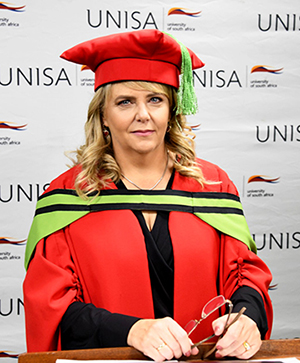
Prof Bernadene de Clercq
On Wednesday 11 May 2022, the College of Accounting Sciences celebrated the achievements of Prof Bernadene de Clercq from the Department of Taxation, when she gave her inaugural virtual lecture, entitled "Determining the South African personal finance ecosystem through a living lab approach".
What started as a referral by a friend to take up a contract position at Unisa 20 years ago has led to what De Clercq refers to as a "blessing" in the form of a career that has allowed her to grow into the research environment and, ultimately, be involved exclusively in research and supervision development and teaching.
De Clercq now enjoys being a project leader of the Motheo Financial Dialogues Living Lab project, a project aimed at developing an open online financial education initiative to assist the youth of South Africa with their financial decisions when they enter the world of work. To date, she has supervised four PhDs and seven MPhils to completion.
"My inaugural lecture," said De Clercq, "is an overview of my research career and how I have applied the quadruple helix model in the various strands of research activities. Although not intended originally, I have adopted a systems theory approach to my research and, therefore, the exploration of a systemic approach to address intolerable problems such as low levels of financial literacy and financial exclusion. Collaboration across various institutions is now more necessary than ever and, at this point in my career, I hope to focus on the development of an open online financial education initiative that will provide free financial education to those that need it the most – the youth of South Africa."
Speaking after the event, De Clercq said that she has been interested in taxation and personal finance from the early days of her career. "This," she said, "led me to qualify as a chartered accountant and a certified financial professional, with taxation being the bridge between the two professions. I have always been interested in helping people to became involved in managing their own finances and this has led to my being involved in numerous research endeavours in the personal finance domain. In summary, my research interests are personal finance operationalised through empowerment and enhancing financial capability to improve consumers’ economic and financial wellbeing. I am also interested in how taxation and taxpayer education can contribute to economic and personal financial wellbeing."
Supervision requires a lot of commitment, not only from the student but from the supervisor as well. "A student places a lot of trust in a supervisor to guide them during their studies and supervisors must ensure that they recognize this trust and deliver accordingly," said De Clercq. "As you supervise a student, it is not possible to ignore the person involved. You also need to recognise that the relationship changes to a mentorship relationship during the supervision process; it is thus inevitable that you will be both a supervisor and a mentor during the supervision journey. Supervision requires self-discipline to ensure that the student’s own voice is heard, and that the supervisor does not conduct the study on behalf of the student. Thus, when I agree to supervise a student, it is not a commitment I take lightly."
De Clercq is a research associate at the Westpac Massey Fin-Ed Centre, University of Massey, New Zealand.
She is also a member of the OECD/INFE Research Group, focusing on financial education around the world. As a member, she had the privilege to attend several of the OECD/INFE meetings in Paris, France, where regulators from around the world attended. She is also a member of the Alliance of Financial Capability Academics (AFCA), a global research network for academics working towards the development of financial capability.
"Currently I am involved in two international projects," said De Clercq. "The first one is a comparison of the personal finance ecosystems in South Africa and the United Kingdom, this is a collaboration with the University of Aston. This project will inform the work we do for the Engaged Scholarship project; as part of the project, we will focus on identifying best practice for the development and implementation in financial education. I am also working with the University of Mannheim on a project that focuses on developing a tax literacy competency framework; in this project, we want to determine whether it is possible to develop a framework that could be applied across several cultures and countries."
"In terms of the quadruple helix model that underpins much of my work, engaged scholarship allows us to bridge the gap between academia and government, and not only between academia and the community," said De Clercq. "Through our Engaged Scholarship project, we have adopted a participatory approach that allows for participation across various stakeholders, not only at a high level but also at grassroots level. For example, in our Engaged Scholarship CE project, the youth of South Africa will be actively involved in the design, development and evaluation of the programme that we are developing for them – this will ensure that the project is developed by the youth for the youth. However, it also allows for the expertise and experience of other beneficiaries in providing context and content, as there is much that the youth don’t yet know. Thus, through collaboration with many diverse partners, each partner’s position is acknowledged and respected, resulting in the sum’s being far greater than the individual parts."
De Clercq said that she has a fantastic support structure. "My husband assisted a lot in managing the parental duties when our children were still young," she said. "I am really blessed to have a life partner that appreciates my career as much as his own and is committed to raising our children in a partnership. What really worked for me while completing my own studies was the fact that I am an early riser; thus, I would start working at around 04:00 and could complete two hours of dedicated and uninterrupted work before the family or anything else required my attention. Balance is something that must be planned for and managed, otherwise either your personal life or your studies will be jeopardised. Personal dedication and commitment to your work is a crucial element of success."
"Research is a long-term investment, and you need to recognise that it is a lengthy process from the moment of conceptualisation until finalisation," concluded De Clercq. "However, it is also a very rewarding experience when your research insights are used to solve real-life problems."
* By Ntsako N Mohlaba, Communication and Marketing Specialist, College of Accounting Sciences
Publish date: 2022-05-17 00:00:00.0
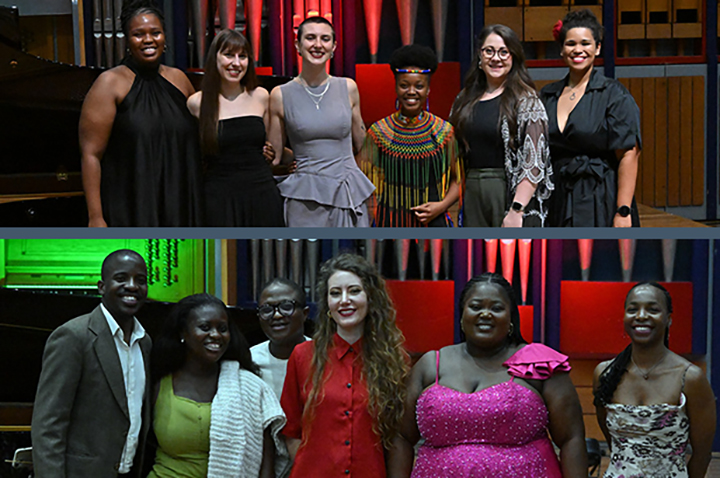 The 7th Unisa International Voice Competition nears the finale
The 7th Unisa International Voice Competition nears the finale
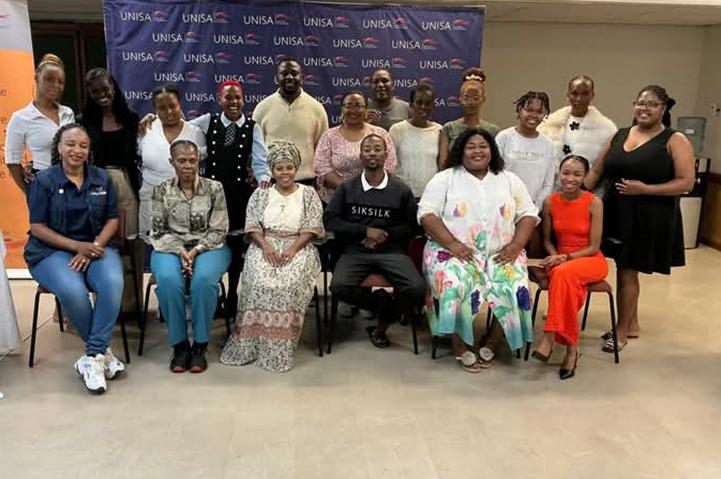 Unisa expands ways to hear student voices
Unisa expands ways to hear student voices
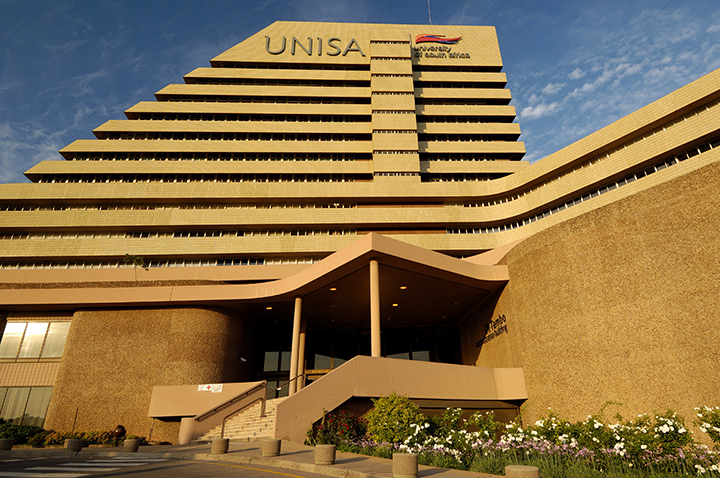 THE Rankings demonstrate Unisa's unceasingly enhanced academic agenda
THE Rankings demonstrate Unisa's unceasingly enhanced academic agenda
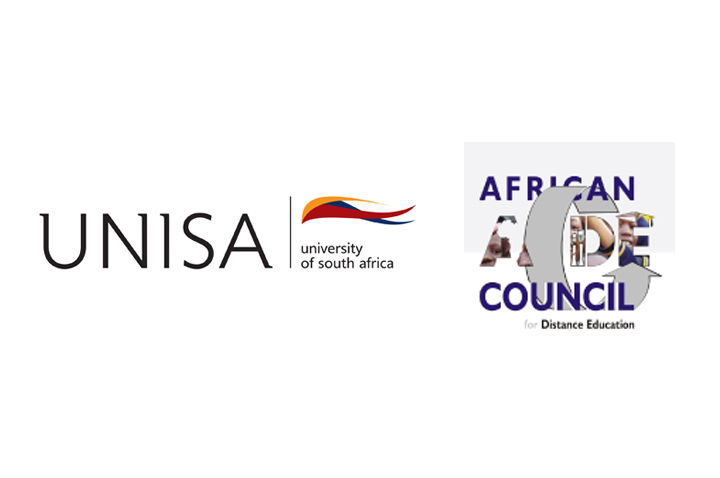 Unisa to host the illustrious ACDE's 20th Anniversary Seminar
Unisa to host the illustrious ACDE's 20th Anniversary Seminar
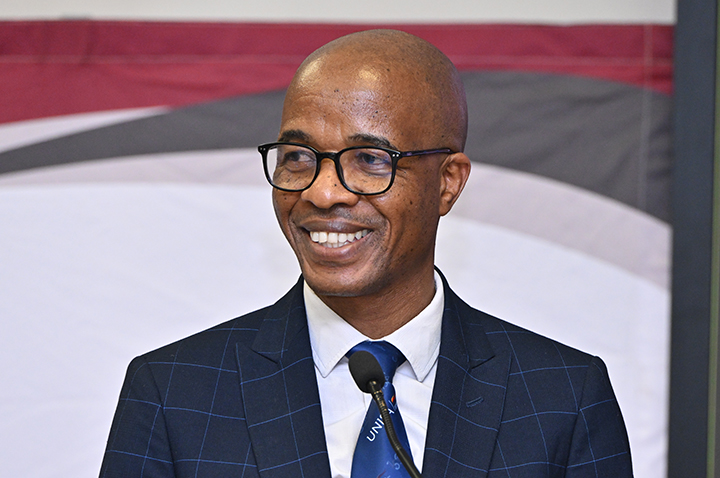 Unisa scholar honoured for reimagining Africa's archival future
Unisa scholar honoured for reimagining Africa's archival future